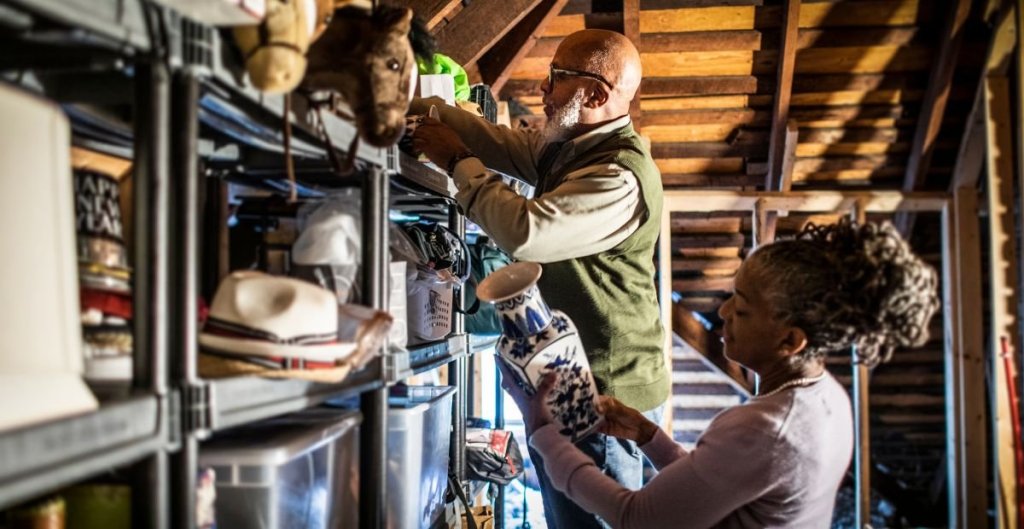It’s no secret that Americans on average have too much stuff. Yay, capitalism!
Seriously, though, most of us bring new things into our homes pretty regularly, and if we aren’t purging regularly, they start to accumulate. We fill drawers, closets, bins, basements and garages with it, and then at some point realize we’re swimming in stuff and need to declutter.
The problem is, as much as we may want to pare down and simplify, a lot of us are really bad at getting rid of things. Decluttering involves decision-making, and decision-making can be exhausting. There are also psychological and emotional reasons we hold onto things, and those mental hurdles are often what we need the most help overcoming.
So along with practical decluttering tips like having a garbage bag and a giveaway box with you as you go through different areas of your home, try using these four mantras to help clear the mental clutter that makes physical decluttering difficult.
1. “Stuff = stress”
There’s plenty of research that shows clutter causes stress and anxiety, and it’s pretty hard not to have clutter when you have too much stuff. Keeping the why of decluttering front and center can help keep you motivated as you start to purge.
Every item in your home costs you time and energy every time you encounter it. Moving the thing from one place to another, deciding where to put it, cleaning or dusting it, or even just having it take up space in your life costs you something mentally. Lots of small things add up to a large mental load, so ask yourself—Is this item worth what it’s costing me?
Stuff = stress. Less stuff = less stress. Keep that simple, freeing truth top of mind as you declutter.
2. “Maybe means no”
We’ve all been there with something in our hand trying to decide whether to keep it.
This notebook might come in handy sometime…
Maybe I’ll want to wear this dress one day…
But I might need that gadget in the future…
Nope, nope, nope. As soon as the words “might” or “maybe” come into your decision-making process, it’s a sign to ditch the thing. “Maybe” or “might” means you don’t need it right now, you aren’t using it right now, and you don’t know if you ever will.
If you keep things on the off chance that you might need them someday, you’ll never get rid of anything. The reality is there are very few things that you won’t be able to get in the future if you really need it. Your home is not a general store. And you are living in your home right now, not in the future.
When it comes to decluttering, maybe means no. Every time.
3. “Things aren’t memories”
This is a tough one for a lot of people to swallow, but some of us hold onto way too many things for sentimental reasons because we tie them to memories. Souvenirs, playbills, concert tickets, wedding gifts, grandma’s knick-knacks—so many things that make us go “Aww, remember when…” when we look at them, but here’s the thing:
Things are things. Memories are memories. Things aren’t memories. You can 100% still have the memories without keeping the things.
Things might trigger memories, but you can easily accomplish that by taking a photo of the thing that triggers the memory and getting rid of the thing itself. Make a “mementos” photo album for all those “but that reminds me of that happy thing” memory triggers and pass on the things themselves.
Of course, there may be some genuinely meaningful and valuable personal treasures that you truly love and want to hold onto. But most memory-associated items aren’t that. They’re just things. Keep the memories. Let the things go.
4. “Keep it flowing”
This is the main mantra to hold onto as you move forward. Once you’ve decluttered to a point where you feel light and free and good about what you have, it’s time to think about how to maintain that sense of freedom. And the key to that maintenance is, “Keep it flowing.”
Rather than seeing your home as a receptacle to inevitably get filled up, see it as a channel that things naturally flow in and out of. Look at it as a flowing river, not a stagnant pond. New things will always be coming into our lives, therefore old things need to go out.
The reason we end up with so much stuff is that we fail to recognize this flow. Some of us come from a deprivation mindset, so we are afraid to let things go even when new things come in. Some of us are influenced by the “more is more” mindset of consumer society, so we keep adding without subtracting to keep a balance.
In our modern world, things come and go. Keep that flow going on purpose whenever you bring something into the house, and you won’t have to do another big declutter project again.


































